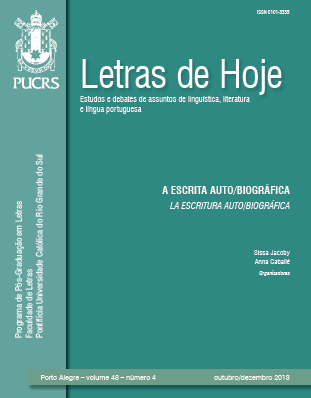The testimonial delirium of the self, the performatic conversions about Los Sorias,
Keywords:
Performatic literature, Self-writing, Hispano-American LiteratureAbstract
From reading the novel Los sorias, 1998, of the Argentine writer Alberto Laiseca, I propose some hypotheses showing two figurations collected by narratives and procedures throughout the novel and suggest that they offer themselves as evidence of the extent of the basic contradictions world in which the novel stands and, of course, the world created in this narrative. On the one hand, the idea of testimonial delirium, a kind of convergence of self-reflection and autobiographical impulse potentiated in proportion to the face of traumatic experiences lived in the twentieth century, which I call here testimonies delusional. On the other, the image, embodied in some main characters of the novel, especially in Monitor, the dictator who mutates throughout the novel, a change from evil to good, which coincides with the defeat in the war, a trace of feeling redemption, which connote the possibility of a rebirth. The destruction, in fury and stubbornness caused by war, ideology, humanism and the very notion of humanity and civilization follow new rearrangements, gaining unprecedented forms and movements. In other words, we see the emergence of a sensibility that can displace the imaginary horizon. When it is no longer possible to rethink the relationship between man and the world is required to produce the human being itself a radical shift, absolutely heartbreaking, that place open to the effects caused by the sufferings of his fellow men, and so I’m calling here performingconversions.
Downloads
Downloads
How to Cite
Issue
Section
License
Copyright
The submission of originals to Letras de Hoje implies the transfer by the authors of the right for publication. Authors retain copyright and grant the journal right of first publication. If the authors wish to include the same data into another publication, they must cite Letras de Hoje as the site of original publication.
Creative Commons License
Except where otherwise specified, material published in this journal is licensed under a Creative Commons Attribution 4.0 International license, which allows unrestricted use, distribution and reproduction in any medium, provided the original publication is correctly cited.






